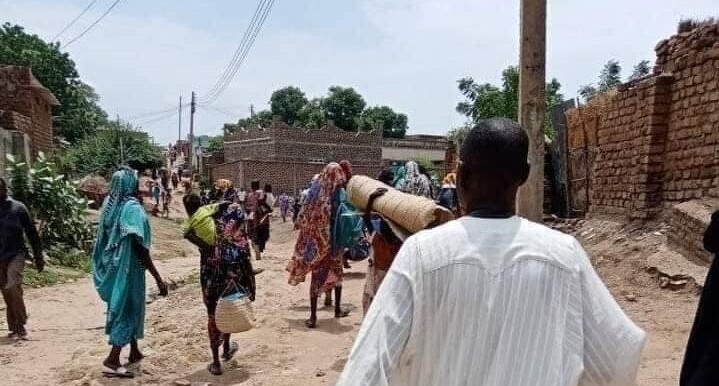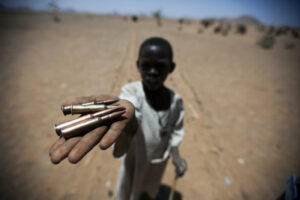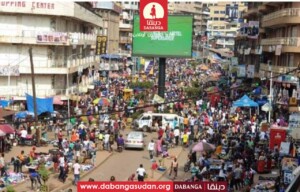Native administration condemn ‘weak response’ of Sudan’s Blue Nile gov to crisis

Hausa people fleeing El Roseires in Blue Nile region after the eruption of violence on July 16 (File photo)
Native administration leaders of the Blue Nile region are calling for the replacement of Ahmed El Omda, the acting governor of the Blue Nile region because of his “weak response” to the ongoing crisis.
The leaders* criticised the governor’s inability to diffuse the crisis following inter-communal violence in the area south of the capital Ed Damazin and neighbouring town El Roseires in July, and again in October. “As fighting continues, at least 1,200 people have been displaced and an unconfirmed 170 people have been killed and 327 have been injured,” UN Office for the Coordination of Humanitarian Affairs (OCHA) reported in November.
In a press statement yesterday, the native administration leaders called on the members of the Sudan Revolutionary Front rebel alliance that signed the 2020 Juba Peace Agreement, and whose leaders are currently in power, to support the replacement of the governor.
They explained that they travelled to Khartoum at the invitation of the head of the Sovereignty Council and Commander-in-Chief of the Sudan Armed Forces Abdelfattah El Burhan, in response to rumours that they had been placed under house arrest.
They indicated their readiness to sit with “all components and notables of Blue Nile to present a unified vision to solve the crisis.”
The statement comes after angry crowds torched the government secretariat, stormed the 4th Infantry Division, and raided the ammunition depot on October 23. People also closed the Singa bridge and prevented vehicles from leaving and entering the city, demanding the dismissal of El Omda after months of resurfacing inter-communal violence.
State of emergency
On December 21, a decree issued by El Omda extended the state of emergency in the region for 30 days. The decree directed commanders of the government forces to intervene to stop inter-communal clashes and impose the Rule of Law in Blue Nile region. It grants them “full legal powers to take appropriate measures, according to the nature of the situation.”
A Radio Dabanga listener from Ed Damazin, Abdelbagi Babikir, said that he welcomes the extension of the state of emergency “because it enhances security and we all expect friction during the harvest season.” He said the state of emergency is a positive way to resolve conflict and reach reconciliation.
University lecturer Hasan Hamza accused the authorities of “resorting to quick security solutions because of their inability to find real solutions.” The roots of the problem must be addressed after they have been researched, he told Radio Dabanga on Thursday.
Activist Arafat El Tom told Radio Dabanga that she considers the extension of the state of emergency “a violation of freedom.” She denied that the situation in the region calls for such a heavy measure, saying that “tribal conflicts must be addressed from their roots and not by imposing a state of emergency.”
‘Impending catastrophe’
Late November, the Minister of Health in the Blue Nile region Jamal Nasir warned of an impending health catastrophe owing to the lack of adequate sanitation facilities available in the school buildings being used as shelters by the recently displaced. He described the violence as “systematic killing and a war akin to genocide.”
“Since the beginning of 2022, about 298,000 people were displaced, 896 people were reported killed, and another 1,092 were injured due to conflict and violence in Sudan.” According to OCHA’s latest update, Blue Nile hosts the largest number of displaced, a total of 127,961 people.
About 17,600 displaced in Khor Ajwal, White Nile state, who have been arriving from Blue Nile since July, need urgent aid according to the findings of an inter-agency needs assessment mission that visited the area in November.
Women and human rights groups, including the Strategic Initiative for Women of the Horn of Africa, the No to Women’s Oppression Initiative, and the Nuba Mountains Women’s Union, submitted a memorandum to the UNCHR office on November 27, condemning the failure of the authorities to contain conflict and to protect people in the Blue Nile region and West Kordofan.
* The Native Administration was instituted by British colonial authorities seeking a pragmatic system of governance that allowed for effective control with limited investment and oversight by the state. The state-appointed native administration leaders also took on new responsibilities for executing policies, collecting taxes, and mobilising labour on behalf of the central government. According to the Darfur Bar Association (DBA), Sudan’s native administration during the 30-year rule of dictator Omar Al Bashir did not represent the real community leaders.











 and then
and then